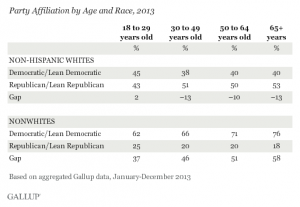…than it looks:
In 2012 – according to exit polls – House Democrats won 60 percent of voters ages 18-29, 51 percent of voters ages 30-44, 47 percent of voters ages 45-64, and 44 percent of voters ages 65 and older. That combination was enough to win them a 49 percent to 48 percent plurality of all votes cast for House (even if Republicans still kept a comfortable majority thanks to Democrats’ inefficient distribution on the map and redistricting).
But had Democrats won the same levels of support among each age group in 2010, Republicans would still have won a clear plurality of all votes cast that year. How? Voters under the age of 30 were 19 percent of all voters in 2012, but just 12 percent of all voters in 2010. Likewise, voters 65 and up were 17 percent of all voters in 2012, but 21 percent of all voters in 2012. Herein lies the biggest danger for Democratic candidates in 2014.
And it looks pretty bad. Basically, the Democrats have the usual “their demographic groups don’t turn out in midterms” problem; and there’s no indication that they’re doing anything effective in reversing that for 2014. Or, more accurately, there’s no indication that Barack Obama is doing anything effective in reversing that for 2014, largely because he doesn’t really care. “I won,” remember? That’s the motto of this administration, first, last, and always.
Continue reading Actually, this Cook Political Report is even MORE problematical for Democrats…

